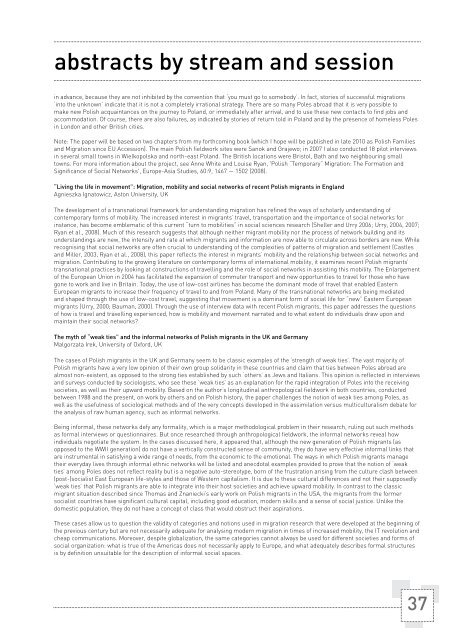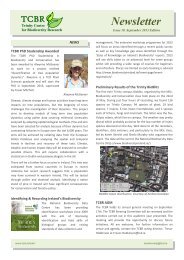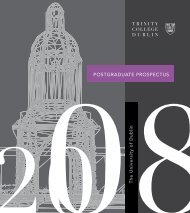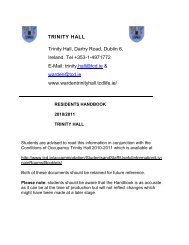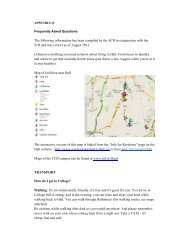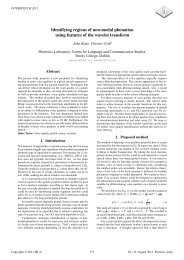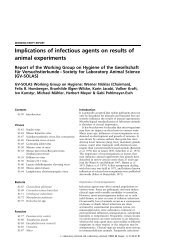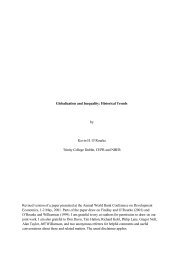Conference Programme (PDF, 1019KB) - Trinity College Dublin
Conference Programme (PDF, 1019KB) - Trinity College Dublin
Conference Programme (PDF, 1019KB) - Trinity College Dublin
You also want an ePaper? Increase the reach of your titles
YUMPU automatically turns print PDFs into web optimized ePapers that Google loves.
abstracts by stream and session<br />
in advance, because they are not inhibited by the convention that ‘you must go to somebody’. In fact, stories of successful migrations<br />
‘into the unknown’ indicate that it is not a completely irrational strategy. There are so many Poles abroad that it is very possible to<br />
make new Polish acquaintances on the journey to Poland, or immediately after arrival, and to use these new contacts to find jobs and<br />
accommodation. Of course, there are also failures, as indicated by stories of return told in Poland and by the presence of homeless Poles<br />
in London and other British cities.<br />
Note: The paper will be based on two chapters from my forthcoming book (which I hope will be published in late 2010 as Polish Families<br />
and Migration since EU Accession). The main Polish fieldwork sites were Sanok and Grajewo; in 2007 I also conducted 18 pilot interviews<br />
in several small towns in Wielkopolska and north-east Poland. The British locations were Bristol, Bath and two neighbouring small<br />
towns. For more information about the project, see Anne White and Louise Ryan, 'Polish “Temporary” Migration: The Formation and<br />
Significance of Social Networks', Europe-Asia Studies, 60:9, 1467 — 1502 (2008).<br />
“Living the life in movement”: Migration, mobility and social networks of recent Polish migrants in England<br />
Agnieszka Ignatowicz, Aston University, UK<br />
The development of a transnational framework for understanding migration has refined the ways of scholarly understanding of<br />
contemporary forms of mobility. The increased interest in migrants’ travel, transportation and the importance of social networks for<br />
instance, has become emblematic of this current “turn to mobilities” in social sciences research (Sheller and Urry 2006; Urry, 2004, 2007;<br />
Ryan et al., 2008). Much of this research suggests that although neither migrant mobility nor the process of network building and its<br />
understandings are new, the intensity and rate at which migrants and information are now able to circulate across borders are new. While<br />
recognising that social networks are often crucial to understanding of the complexities of patterns of migration and settlement (Castles<br />
and Miller, 2003, Ryan et al., 2008), this paper reflects the interest in migrants’ mobility and the relationship between social networks and<br />
migration. Contributing to the growing literature on contemporary forms of international mobility, it examines recent Polish migrants’<br />
transnational practices by looking at constructions of travelling and the role of social networks in assisting this mobility. The Enlargement<br />
of the European Union in 2004 has facilitated the expansion of commuter transport and new opportunities to travel for those who have<br />
gone to work and live in Britain. Today, the use of low-cost airlines has become the dominant mode of travel that enabled Eastern<br />
European migrants to increase their frequency of travel to and from Poland. Many of the transnational networks are being mediated<br />
and shaped through the use of low-cost travel, suggesting that movement is a dominant form of social life for “new” Eastern European<br />
migrants (Urry, 2000; Bauman, 2000). Through the use of interview data with recent Polish migrants, this paper addresses the questions<br />
of how is travel and travelling experienced, how is mobility and movement narrated and to what extent do individuals draw upon and<br />
maintain their social networks?<br />
The myth of “weak ties” and the informal networks of Polish migrants in the UK and Germany<br />
Malgorzata Irek, University of Oxford, UK<br />
The cases of Polish migrants in the UK and Germany seem to be classic examples of the ‘strength of weak ties’. The vast majority of<br />
Polish migrants have a very low opinion of their own group solidarity in these countries and claim that ties between Poles abroad are<br />
almost non-existent, as opposed to the strong ties established by such ‘others’ as Jews and Italians. This opinion is reflected in interviews<br />
and surveys conducted by sociologists, who see these ‘weak ties’ as an explanation for the rapid integration of Poles into the receiving<br />
societies, as well as their upward mobility. Based on the author’s longitudinal anthropological fieldwork in both countries, conducted<br />
between 1988 and the present, on work by others and on Polish history, the paper challenges the notion of weak ties among Poles, as<br />
well as the usefulness of sociological methods and of the very concepts developed in the assimilation versus multiculturalism debate for<br />
the analysis of raw human agency, such as informal networks.<br />
Being informal, these networks defy any formality, which is a major methodological problem in their research, ruling out such methods<br />
as formal interviews or questionnaires. But once researched through anthropological fieldwork, the informal networks reveal how<br />
individuals negotiate the system. In the cases discussed here, it appeared that, although the new generation of Polish migrants (as<br />
opposed to the WWII generation) do not have a vertically constructed sense of community, they do have very effective informal links that<br />
are instrumental in satisfying a wide range of needs, from the economic to the emotional. The ways in which Polish migrants manage<br />
their everyday lives through informal ethnic networks will be listed and anecdotal examples provided to prove that the notion of ‘weak<br />
ties’ among Poles does not reflect reality but is a negative auto-stereotype, born of the frustration arising from the culture clash between<br />
(post-)socialist East European life-styles and those of Western capitalism. It is due to these cultural differences and not their supposedly<br />
‘weak ties’ that Polish migrants are able to integrate into their host societies and achieve upward mobility. In contrast to the classic<br />
migrant situation described since Thomas and Znaniecki’s early work on Polish migrants in the USA, the migrants from the former<br />
socialist countries have significant cultural capital, including good education, modern skills and a sense of social justice. Unlike the<br />
domestic population, they do not have a concept of class that would obstruct their aspirations.<br />
These cases allow us to question the validity of categories and notions used in migration research that were developed at the beginning of<br />
the previous century but are not necessarily adequate for analysing modern migration in times of increased mobility, the IT revolution and<br />
cheap communications. Moreover, despite globalization, the same categories cannot always be used for different societies and forms of<br />
social organization: what is true of the Americas does not necessarily apply to Europe, and what adequately describes formal structures<br />
is by definition unsuitable for the description of informal social spaces.<br />
37


